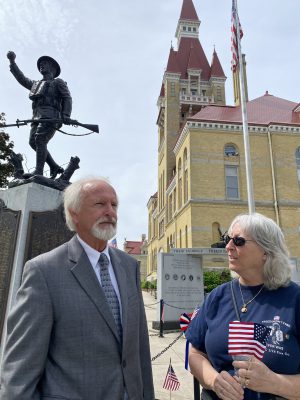West Bend, WI – On Monday, May 31, 2021 Washington County Judge Andrew Gonring delivered, what many said, was the best Memorial Day address in West Bend. It was so good, one veteran said it should be a part of the education program in local schools. Below is Gonring’s full speech.

Thank you Scott. Ladies and Gentleman, Veterans, Gold Star Families and Honored guests: Good Morning,
Let me start by saying it is truly an honor and a privilege to be asked to speak here today and certainly not the kind of invitation that one familiar with this annual program would ever turn down. As a native West Bender, born and raised, I have attended this program countless times over my lifetime and I have always considered this Memorial Day program to one of our city’s finest traditions.
I have many fond memories of this annual program going back to my childhood—back when the gathering space was around the corner on 5th Avenue before this beautiful plaza was constructed– as I’m sure many of you recall.
I remember attending this program as a youngster and being handed my own personal, small American flag as was the custom back then, a tradition continued during the parade by the West Bend Police Department today, and thinking what a thrill it was to be able to be part of the ceremony, which has changed very little since then, by waiving that flag.
I remember participating in this program in high school as a member of the West Bend High School chorus and later, as an adult, on several occasions as a member of the Peter Ayer Ensemble. I recall watching my wife, Pat, participate as a member of the River City Irregulars, and I recall both my youngest sister Meg reciting “In Flanders Fields” as a High School student and, in the same capacity some years later, my oldest son Ben reciting the Preamble.
And I also remember my father, Mike Gonring, marching every single year in the parade preceding these ceremonies with Allan Kieckhafer and his fellow veterans as a member of the Army Air Corps during the Second World War, well into his 80’s until he was physically unable to do so, always dressed in a coat and tie to reflect the solemnity of the occasion, always wearing his Legion cap– and for years I proudly displayed in my chambers at the courthouse a photo I took of my Dad so attired standing alongside of the World War Two Memorial behind me after one of these services.
Those are some of the memories I have of this fine West Bend tradition held annually on this same courthouse square, a square dedicated to the public by the founding fathers of our city in 1846.
We in West Bend are fortunate to have many fine annual traditions in our city—our annual Christmas parade, our 4th of July festivities and various other gatherings sponsored by both the city and other organizations.
But what makes this annual tradition different than any other of our many traditions– is the reason we gather here in this same local every year and that is to both honor and remember those members of our community who have made the ultimate sacrifice in the defense of our nation.
Despite my fond memories, it is not the parade, the marching, the bands, the flags, the recitations or the singing. Many of our other traditions incorporate some or all of those aspects. It is the recognition that the sacrifice made by those we honor today must never be forgotten no matter what the circumstances may be. This is the day that we, as Americans, pay our respects to those who gave their lives asking only one thing in return—that we remember them.
We have heard the history of this, the most solemn of our holidays, at past programs but I think it bears some repeating because it puts in context how we arrived here today.
Compared to some older civilizations, honoring those who have fallen in defense of their county is a relatively new tradition in this country, really originating after the Civil War ended in 1865. The bodies of the over 600,000 Americans killed in that conflict, more than any other conflict in our nation’s history, could be found in nearly every churchyard in every city, town and hamlet throughout the States then making up our Union.
By the end of the 1860’s, citizens of these small towns and cities began to decorate the graves of those who had fallen in that war with flowers and ribbons.
As we heard in John’s fine recitation of the General Order, what we now call Memorial Day really got its start when General John A. Logan, the head of the Union Veterans Association, also referred to as the Grand Army of the Republic, had the idea of coordinating these many individual ceremonies into a national holiday by issuing a decree calling for a nationwide day of remembrance to be held on May 30th, 1868 for the purpose of strewing with flowers or otherwise decorating the graves of the fallen Civil War comrades, a day he referred to as Decoration Day, as we heard in the recitation of the General Order.
General Logan’s May 30th holiday continued to grow throughout the end of that century and was eventually renamed Memorial Day by the start of the 1900’s.
While some southern states refused to acknowledge a holiday that honored Union dead, by the end of the First World War with its 130,000 casualties from both sides of the Mason Dixon line, the country was firmly bonded in recognizing May 30th, Memorial Day, as a day to honor all those killed in all battles going back to the Revolutionary War.
Communities such as ours continued to honor the tradition started by General Logan every May 30th until 1968, when Congress passed the Uniform Monday Holiday Act which not only formally made Memorial Day a national Holiday but decreed that it be celebrated on the 4th Monday of the month of May commencing in 1971.
Here in West Bend Decoration Day was first celebrated on May 29, 1880, May 30th of that year falling on a Sunday. While we may have been behind other Washington County communities in celebrating Decoration Day, in 1880, local veterans finally heeded General Logan’s call and joined together in decorating the graves of their fellow Civil War brethren killed in that war.
I mentioned earlier that this ceremony has changed little over the years. I know from my research that this same basic format goes back to the 1930’s including having high school students, recite both In Flanders Field and the Gettysburg address just as Madison and Mackayla did so well today goes back to the 1930’s.
We may not be as familiar with In Flanders Field as the Gettysburg Address. That poem was written by a Canadian Army Doctor, Lt. Colonel John McCrae after a particularly devastating battle in Belgium in 1915 during the First World War after which he was called upon to lead funeral services for a close fallen friend in the absence of the Company Chaplain. Of significance to us is the reference to the red poppies which gives rise to the red artificial remembrance poppies that we wear on our lapels and are all familiar with.
On the other hand, we are all certainly familiar with the Gettysburg Address delivered by President Lincoln on November 19th, 1863 at the dedication of the Gettysburg Soldiers Cemetery some four and one half short months after that famous Union victory which claimed over 23,000 casualties on each side of the battle.
It is without doubt the single most famous speech in American history.
Despite the fact that the Civil War was far from over and despite the fact that the small town practice of remembering those who fell during that war by decorating their graves had not yet begun, it was as though Lincoln recognized what our obligation to those who gave their lives in the defense of their country should be then as well as into the future.
In the span of 2 short minutes and in less than 275 words, President Lincoln, I believe, said more about the purpose of the future day of remembrance that we now call Memorial Day than could be said in 30 times that amount.
For example, Lincoln recognized that it is “altogether fitting and proper” that we today, as they did at that Gettysburg dedication, gather together to honor those who gave their lives “that this nation might live”. But at the same time, as Lincoln noted then, nothing we do or say today could ever compare to the deeds of those honored dead in making the ultimate sacrifice.
As Lincoln noted then, and as is true today, the world will little note nor long remember what we say here today. But what is truly important is that we never forget their sacrifice and that we honor their memory by dedicating ourselves to the ideals that they fought and died for, because if we don’t so dedicate ourselves, these honored dead “shall have died in vain”.
As President Lincoln noted, it is a two-step process; not just remembering the fallen but holding true to those principals of our nation for which they died.
Some three years before he visited our city, President Ronald Reagan in his 1984 Memorial Day address credited President John Kennedy with making a very similar statement a few months before President Kennedy was assassinated when he said “A nation reveals itself not only by the people it produces but by those it remembers” which President Reagan interpreted as meaning that we as citizens of this great country need to reflect the ideals that our honored dead fought and died for by putting those ideals into practice in our daily lives.
Again, not just remembering those heroes, but remembering what they fought and died for.
As a youngster, and even as an adolescent, attending these ceremonies, it was difficult if not impossible to relate to the underlying purpose of this annual ceremony.
Certainly children of my generation knew both of World War II and the Korean War. Many, if not most of us, had fathers and in some cases Mothers, who had served during those conflicts. We had seen the movies, with and without John Wayne. We had studied certain aspects of those wars in school. We had heard the stories and, on occasion, some of us would even don parts of our parents’ service uniforms while we playfully enacted those conflicts as strange as that may now seem.
We all knew neighbors and relatives who had fought in those wars. In our neighborhood, in addition to the many men and fathers who served during WW II, we had our end of the block our neighbor, Mr. Klaus, who served during WW I and would on occasion dress in his doughboy uniform. We had our next door neighbor, Vern, who served during the Korean War and we even had a neighbor and mother of 7 who had served as an officer in the WAVES, the woman’s Naval Reserve unit, during the Second World War.
But still, as a younger person, it was hard to relate to that period of time and the sacrifices that were made both by those who served and particularly those who died.
After all, to someone much younger, those were “ancient times”, something that occurred a whole 10 to 20 years or so ago back then, a time period– as we all now know– was simply a blink of the eye to our parents’ generation, much as that time period is to us today.
And certainly, while we could understand what it means to have been killed in battle, it was difficult to understand the meaning of that sacrifice by someone we never personally knew.
As a result, for me in my younger years, these Memorial Day services were more about the parade, the bands, the recitations and the singing than the underlying purpose of this annual tradition— honoring the memory of those who died in defense of this country and re-committing ourselves to the ideals they died for.
But a certain events fundamentally changed my understanding of what these Memorial Day services really stand for. A certain period of time caused me to appreciate the ultimate sacrifice made by those we honor here each year.
I have had the privilege of visiting both the Civil War battlefield at Gettysburg and some years later the beaches of Normandy along with the Normandy American cemetery at Colleville. It is nearly impossible to stand on the fields of Gettysburg or the sands of Omaha Beach or among the thousands of monuments at that American cemetery and not have a humbling appreciation for what transpired there and the sacrifices made there.
But the single most significant event that years before caused me and much of my generation to have a much clearer understanding of the meaning of Memorial Day was the war in Viet Nam.
Unlike our parents’ war, that war was not ancient history; it was happening in current time. And it wasn’t the movies; it was broadcast nearly live into our homes every evening on the nightly news. And it did not involve the ultimate sacrifice by strangers we never knew.
Those fighting, many of whom are here today, and particularly those dying in that war were members of our community, members of my generation, who walked the same streets I did and who attended the same high school I was attending and, more importantly, who I knew.
These local heroes have been mentioned in past Memorial Day services here, men like Sgt. Glen Dean, a 1966 graduate of West Bend High School, four years my senior and a popular and terrific cornet player with the high school band, killed in action on August 27, 1968; and PFC Thomas Crook, who I remember well, three years my senior, a 1967 Graduate of WBHS, killed in action on February 23, 1969 and all the others referenced by Scott Mindel in his daily Facebook posts preceding this holiday.
I have to believe that it is nearly impossible for someone of my generation not to have a much better understanding of the meaning of Memorial Day having lived through those times. Just as with our parent’s generation, these were individuals dying in the service of their country who were very much a part of the community that honors them today.
But I do have a concern. The Viet Nam War is now two generations behind us and although subsequent conflicts, like Iraq and Afghanistan, have taken the lives of members of our community as reflected by the Gold Star families we honor today, those wars will soon be “ancient history” to younger generations, if they are not already.
One of my favorite lyricists once wrote “I know I never will forget what I never did know.” In other words, “One first has to be aware of something in order to remember it’’
My concern is, how do we assure that younger generations will relate to the underlying purpose of this longstanding community tradition and not just look at Memorial Day as the third day of a three day weekend kicking off summer?
Without another major military conflict, which, God willing, we will not face again, how do we assure that future generations will continue to honor those who gave their lives that this nation might live?
I wish I had the answer. Maybe we start by making sure that our children and our children’s children at least honor this day by attending these services for the parade, the bands, the marching and the singing if nothing else, in the hope that someday they will ultimately make the connection as to the true reason we gather here each year.
I do truly believe however, that it is incumbent upon all of to do our very best to attempt to assure that our children and our children’s children continue to both remember those who gave their lives in defense of this country and to re-commitment themselves to ideals those heroes died defending.
That, in the words of Lincoln, is the great task remaining before us as we leave here today. Because if we as a nation fail to continue to recognize this day for what it truly represents, then we run the unforgivable risk that these honored dead shall have died in vain.
I again want to thank the Committee for asking me to speak here today. It is a true honor.
Thanks to all of you for attending today.
God less our Gold Star families,
God bless all the veterans in attendance today. You all have my utmost respect.
God bless the fallen heroes we honor today.
And God bless these United States. Thank you.






